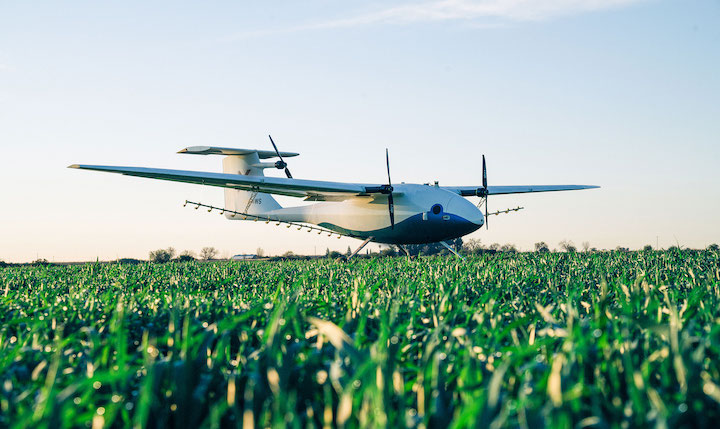The FAA approves largest uncrewed aircraft system in the US
Electric aircraft startup Pyka has received approval from the US Federal Aviation Administration (FAA) to operate its uncrewed zero-emissions aircraft commercially in the US, the company announced Tuesday.
The aircraft, called Pelican Spray, is a highly automated, 1,125-pound crop sprayer, the largest ever uncrewed aircraft system to receive FAA authorization for commercial operation in the US, according to chief operating officer and co-founder Chuma Ogunwole.
The Oakland-based company currently leases its battery-operated aircraft to agricultural and crop-spraying companies in Costa Rica, Honduras and Brazil, helping spray pesticides and fungicides for crops like bananas, cotton, soy and corn. With FAA approval in place, it plans on expanding to farms in the US.

Getting FAA authorization for passenger aircrafts is a long and difficult process and a significant hurdle for the electric aviation industry. The main challenge to electrifying commercial passenger aviation, though, is the limitations of battery technology that make it infeasible to fly any meaningful distance with multiple passengers onboard. For context, Pyka’s small, uncrewed crop sprayers need to land every 15 minutes anyway to refill their chemical tanks, which is also when their batteries are swapped. The crafts are able to carry up to 540 pounds of liquid.
The startup intentionally focused on developing uncrewed vehicles in part because they are easier to get regulatory approval, said chief executive officer and co-founder Michael Norcia. Pyka also recently released a cargo aircraft with around 70 cubic feet of cargo volume — about as much as a Subaru Forester — that is awaiting FAA approval. The two aircrafts are the company’s attempt to “build trust in the technology” before the industry is able to move towards fully electrified passenger aircrafts, he said.
Aviation accounts for roughly 2% of global carbon dioxide emissions. Given the challenges of electrification, most airlines have focused on purchasing sustainable aviation fuel (SAF), which can be made synthetically or using things like plant waste and cooking oil. Those fuels can then be blended with traditional fuels and don’t require planes to install new engines. But SAF is still far from mass commercialization and currently very expensive compared to conventional jet fuel.
Despite the current challenges for both approaches, Norcia said he sees a future 20 years from now in which electric aircrafts run regional, short-haul flights and SAF-powered fleets operate long-haul flights.
Similar Stories

First JetBlue flights from Manchester, New Hampshire take off today
View Article
Alaska Air Group reports fourth quarter and full year 2024 results
View Article
Cathay Pacific and SITA agree to expand network connectivity across 51 global airports
View Article
American Airlines reports fourth-quarter and full-year 2024 financial results
View Article
ECS Group partners with CargoAi to digitalize manual email quotation processes with their CargoCoPilot API
View Article
Chapman Freeborn restructure to expand European cargo operations
View ArticleGet the most up-to-date trending news!
SubscribeIndustry updates and weekly newsletter direct to your inbox!





